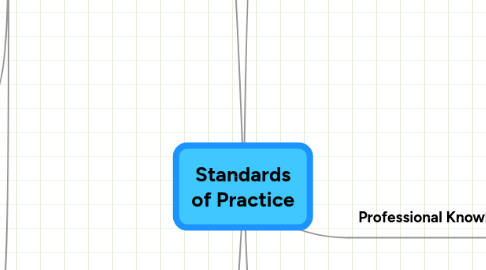
1. Professional Practice
1.1. Pedagogy
1.2. Assessment and Evaluation
1.2.1. Ongoing
1.2.2. Variety
1.2.2.1. Multiple Tools
1.2.2.2. Multiple Contexts
1.2.3. Reliable and Valid
1.2.4. Descriptive Feedback
1.2.5. Student-Centered
1.2.5.1. Self-Assessment
1.2.5.2. Shared Creation of Assessment Tools
1.2.5.3. Peer Assessment
1.2.6. As, For, and Of
1.3. Resources
1.3.1. Technology
1.3.1.1. SMART Board
1.3.1.2. Projector
1.3.1.3. Blogging
1.3.1.4. Computers
1.3.1.5. Glogs
1.3.1.6. Virtual Field Trips
1.3.1.7. PowerPoint
1.3.1.8. Videos
1.3.1.9. Internet
1.3.1.10. Podcasts
1.3.2. Books
1.3.3. Manipulatives
1.3.3.1. Math
1.3.3.1.1. Cubes
1.3.3.1.2. Pattern Blocks
1.3.3.1.3. Calculators
1.3.3.1.4. Geoboards
1.3.3.1.5. Color Tiles
1.3.3.2. Language
1.3.3.2.1. Magnetic Letters
1.3.3.2.2. Interactive Lessons
1.3.3.3. Social Studies
1.3.3.3.1. Maps
1.3.3.3.2. Props
1.3.3.4. Science
1.3.3.4.1. Models
1.3.3.4.2. Experiments
1.3.4. Visuals
1.3.4.1. Charts
1.3.4.2. Diagrams
1.3.4.3. Pictures
1.4. Reflection
1.4.1. Teaching Strategies
1.4.2. Practice
1.4.3. Classroom Management
1.5. Individual Students
1.5.1. Accommodations
1.5.2. Modifications
1.5.3. Differentiation
1.5.3.1. Multiple Intelligences
1.5.3.1.1. Logical-Mathmatical
1.5.3.1.2. Musical
1.5.3.1.3. Linguistic
1.5.3.1.4. Intrapersonal
1.5.3.1.5. Interpersonal
1.5.3.1.6. Spatial
1.5.3.1.7. Naturalist
1.5.3.1.8. Bodily-Kinesthetic
1.5.3.2. Learning Styles
1.5.3.2.1. Auditory
1.5.3.2.2. Visual
1.5.3.2.3. Kinesthetic
2. Ongoing Professional Learning
2.1. Professional
2.1.1. Professional Development Days
2.1.2. Workshops
2.1.3. Conferences
2.1.4. AQ Courses
2.2. Self-Directed
2.2.1. Internet Research
2.2.1.1. Teaching Strategies
2.2.1.2. Classroom Management
2.2.1.3. Organization
2.2.1.4. Technology
2.2.1.5. Lessons
2.2.2. Reading
2.2.2.1. Books about Teaching
2.2.2.2. Books to be used in Teaching
2.2.3. Reflection
2.2.3.1. Everyday
2.2.3.2. Classroom Management
2.2.3.3. Effectiveness of Lessons
2.2.3.4. Teaching Strategies
3. Commitment to Students and Student Learning
3.1. Equity
3.1.1. Gender
3.1.2. Race
3.1.3. Socioeconomic Status
3.1.4. Special Needs
3.1.5. Family
3.2. Respect
3.3. Sensitivity
4. Professional Knowledge
4.1. Student Development
4.1.1. Child Developmental Stages
4.1.2. Individual Development
4.1.3. Factors Affecting Development
4.2. Learning Theory
4.2.1. Behaviorism
4.2.2. Constructivism
4.3. Pedagogy
4.4. Curriculum
4.4.1. Math
4.4.2. Language
4.4.3. Social Studies
4.4.4. Science
4.4.5. Physical Education
4.4.6. The Arts
4.5. Ethics
4.5.1. Care
4.5.2. Respect
4.5.3. Integrity
4.5.4. Trust
4.6. Research
5. Leadership in Learning Communities
5.1. Learning Communities
5.1.1. Collaborative
5.1.1.1. Teacher and Students
5.1.1.2. Teacher and Colleagues
5.1.1.3. Students and Students
5.1.2. Safe
5.1.2.1. Anti-Bullying
5.1.3. Supportive
5.1.3.1. Accepting
5.1.4. Respectful
5.1.5. Open
